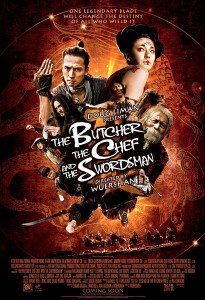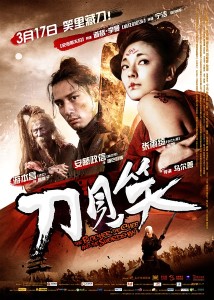The Butcher, the Chef and the Swordsman
刀见笑
China/US/Hong Kong, 2010, colour, 1.85:1, 89 mins.
Director: Wuershan 乌尔善.
Rating: 7/10.
Fox International’s second Chinese production is a rich stew of clever script and tasty cast.
A remote area in Ancient China. Desire 愚痴. Ugly butcher Chopper (Liu Xiaoye) falls for the beautiful Madam Mei (Zhang Yuqi), chief courtesan at The House of a Thousand Flowers, and tries to buy her. But then swordsman Big Beard (Senggerenqin) arrives and demands Madam Mei. Upset at being rebuffed, Chopper sharpens his cleaver and returns to exact vengeance. Vengeance 嗔怒. Eight Course Chef (Mi Dan), the dwarf owner of the famed South Beauty Restaurant, is told that the powerful and ruthless Eunuch Liu (Xie Ning) is passing by in a month’s time and wants to eat his renowned eight-course meal, The Eight Immortals Cross the Sea. If anything gos wrong, he’ll pay for it with his life. The chef  chooses a mute apprentice (Ando Masanobu) and trains him up to take his place, passing on the secret of his classic final dish, a live fish that is sliced so fast that it thinks it’s still alive when it’s on the plate (and thus at its freshest). But the apprentice is not all he seems. Greed 贪婪. Swordsman Dugu Cheng (Xu Chong) has inherited from his father a lump of iron that was made by Fat Tang (You Benchang) from the melted-down swords of all the champion warriors. Dugu Cheng tells Tang to forge a sword from the iron, so he can become the No. 1 Swordsman. But all does not go according to plan when Dugu Cheng faces his enemies in combat. The iron from that sword then connects with the stories of the chef and the butcher.
chooses a mute apprentice (Ando Masanobu) and trains him up to take his place, passing on the secret of his classic final dish, a live fish that is sliced so fast that it thinks it’s still alive when it’s on the plate (and thus at its freshest). But the apprentice is not all he seems. Greed 贪婪. Swordsman Dugu Cheng (Xu Chong) has inherited from his father a lump of iron that was made by Fat Tang (You Benchang) from the melted-down swords of all the champion warriors. Dugu Cheng tells Tang to forge a sword from the iron, so he can become the No. 1 Swordsman. But all does not go according to plan when Dugu Cheng faces his enemies in combat. The iron from that sword then connects with the stories of the chef and the butcher.
REVIEW
Fox International’s second sortie into Chinese production – but like the first, Hot Summer Days 全城热恋 (2010), not initiated by it – is also a collection of stories but cleverly inter-linked rather than separate. This obviates the cross-cutting that impeded some of the emotional development of Days, giving it more the feel of a single movie from start to finish, especially in the clever script developed over the space of two years by five writers from a short story, Legend of the Kitchen Knife 菜刀传奇, by An Changhe 安昌河. The connection between the stories only emerges gradually, finding its fulfilment in the final half-hour through a lump of iron that was initially forged into a weapon but later into a cleaver for preparing food – i.e. a transition from war to peace – and finally uniting two lovers. The vaguely moral message in the comic twists and turns in the narratives is underpinned – at least for Chinese viewers – by having the three negative emotions that headline the stories (desire, vengeance, greed) associated with three animals (pig, snake, rooster).
Unlike Days, which had a very southern Chinese/Hong Kong flavour, The Butcher, the Chef and the Swordsman 刀见笑 is thoroughly Mainland and more northern in feel, though the setting is as vague as the era. (The shoot’s main location was actually in Yi county, Hebei province.) Only the hectic pacing and editing seem on the surface more traditionally Hong Kong in flavour; but in fact this style of in-your-face goofiness is being gradually adopted – like much that has been traditionally seen as Hong Kong – into Mainland film-making as the divisions and talent merge into a Greater China industry. Butcher sets a new standard here, but not one that would have seemed so different even five years ago.
The biggest surprise is that the director is Inner Mongolian-born Wuershan 乌尔善, 38, previously known in eclectic circles for his first feature, the grim satirical triptych Soap Opera 肥皂剧 (2004). However, using his experience in TV commercials, and with grungy, exaggerated photography by Polish d.p. Michał Tywoniuk, Wuershan has come up with a rich stew that’s an eight-course meal all on its own. The movie uses every trick in the book from animation, to computer games, to colourised black-and-white, and macabre characters who reach their apogee in super-villain Eunuch Liu – a combination of Jabba the Hut and Fellini’s grotesques in Roma (1972). This segment, with Japanese actor Ando Masanobu 安藤政信 fitting easily into the Chinese cast, is the most entertaining of the three, combining lavatorial humour, Chinese gongfu and clever twists into one.
Among the other hyperactive cast, actress Zhang Yuqi 张雨绮 (CJ7 长江7号, 2008; All about Women 女人不坏, 2008) again serves notice that she’s potentially a charismatic star of the future, while model/actor Xu Chong 徐冲 has considerable fun as an ambitious swordsman. In fact, anything goes in Butcher, which initially makes the movie both confusing and a tad tiring on the senses, but later gives it a vitality that’s both amusing and inventive. A whorehouse rap number shows that Zhang Yimou 张艺谋 was not so far ahead of his time when he tried a similar experiment in his 2009 costume comedy A Simple Noodle Story 三枪拍案惊奇 (2009). That it was unfortunately cut from Sony Pictures Classics’ international version (retitled A Woman, a Gun and a Noodle Shop) only goes to show how far behind the curve the West still is in grasping the rapid evolution of Greater China film-making.
CREDITS
Presented by Taihe Universal Film Investment (CN), Fox International Productions (US), First Cuts Features (CN), Union Voole Technology (CN), Zixuxuanyang Cultural Development (CN), Bolong Investment (CN). Produced by Fox International Productions (Greater China) (HK), First Cuts Features (CN).
Script: Zhang Jiajia, Tang Que, Ma Luoshan, Wuershan, Tang Xiru. Short story: An Changhe. Photography: Michał Tywoniuk. Editing: Huang Zhe. Music: Gongge’er, Dead J, Miquia. Music supervision: Miquia. Production design: Hao Yi. Costume design: Hao Yi. Sound: Zhu Xiaojia, Chen Li. Action: Zhao Hui. Choreography: Fei Bo. Special effects: Hou Fengjing. Visual effects: M-Studio. Titles animation: Zhao Bin (SHFT). Food styling: Yang Dengquan.
Cast: The Butcher: Zhang Yuqi (Madam Mei), Liu Xiaoye (Shaoerliang/Chopper), Han Pengyi (Chun), Dong Lifan (The House of a Thousand Flowers manager), Gao Lei (flautist), Liu Xu (troupe leader), Senggerenqin (Yidaoxian/Big Beard), An Yuncheng (The House of a Thousand Flowers patron). The Chef: Ando Masanobu (Mute), Mi Dan (Eight Course Chef), Xie Ning (Liu, eunuch), Hou Xiang (Little Melon), Man Tingwei (Liu’s aide), Gongge’er (Cheng, apprentice), Zhu Jiang (Wei, apprentice), Gao Yulin (South Beauty Restaurant manager), Wang Ruihuan (young eunuch). The Swordsman: You Benchang (Fat Tang), Xu Chong (Dugu Cheng; Dugu Cheng’s brother; Old Dugu), Yu Weiguo [Daniel Yu], Ning Hao (cock-fighting gamblers), Liu Hua, Xiong Xinxin (swordsmen), Li Ming (young Big Eight Chef), Chen Liwei (young swordsman). Also starring: Cai Hansen, Cao Jiafeng, Chen Xiao, Chu Jun, Deng Jingming, Du Jie, Ge Sichen, He Fei, He Huan, He Jiandan, He Lu, Hu Minzhi, Li Xiang, Li Xin, Li Zhitang, Lian Ye, Liang Huiyuan, Liao Li, Liu Qun, Liu Rui, Liu Xinye, Lu Kaishun, Mou Xiangying, Niu Yiming, Qi Yunwei, Qian Hui, Ren Fei, Sun Junzheng, Sun Qicheng, Sun Yue, Wang Guiying, Wang Haiqian, Wang Haixian, Wang Jiajia, Wang Pinsheng, Wang Rui, Wang Xiaohu, Wen Qiao, Wu Juan, Xiao Hai, Xiao Qiang, Yang Yihui, Yao Ran, Ying Mingyang, Yue Jin, Zhang Dongmei, Zhang Hao, Zhang Jiayang, Zhang Lei, Zhang Mo, Zhang Rong, Zhang Xiaohui, Zhang Xiaoming, Zhang Xinyue, Zhao Gengsheng, Zhao Jie, Zhou Min, Zhu Cong, Zong Sen. Voices: Sun Yuebin (Dugu Cheng), Ling Yun (Dugu Cheng’s brother), Jiang Guangtao (flautist), Guo Zhengjian (Big Eight Chef), Yan Jixuan (The House of a Thousand Flowers manager), Gongge’er (narrator).
Premiere: Toronto Film Festival (Midnight Madness), 16 Sep 2010.
Release: China, 17 Mar 2011; US, 18 Mar 2011; Hong Kong, 7 Apr 2011.
(Review originally published on Film Business Asia, 17 Sep 2010.)
